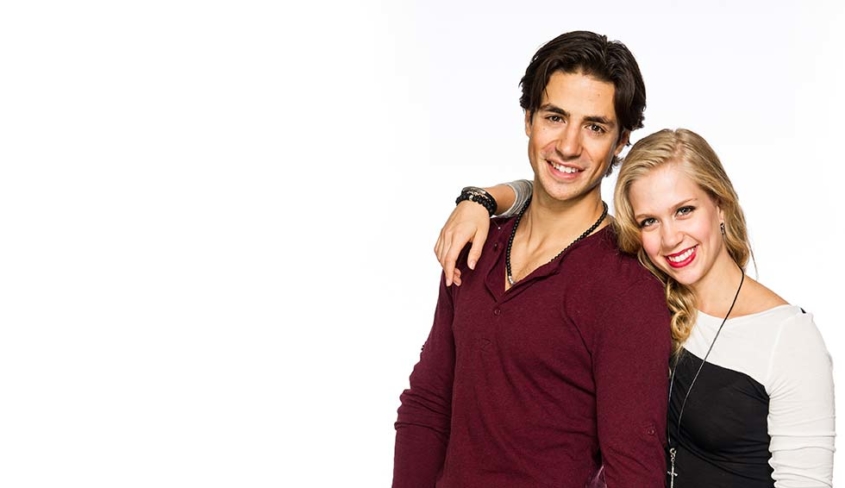Skate Canada Gives Back
With over 180,000 members in some 1400 clubs across the country, Skate Canada reaches into hundreds of communities both large and small. Add to those numbers the thousands of volunteers who steer those clubs, officiate at competitions, run test days and produce ice shows and special events … and we’re talking about a BIG family.
What motivates that family? They’ll all tell you skating isn’t only about triple jumps.
As an organization we’re proud of our learn-to-skate program CanSkate, the work of our clubs, our Synchro skating programs, our National Team and our events … but we’re also proud of the off-ice opportunities we’re given by the sport we all love. Turns out that every day at the rink we’re offered the chance to build relationships, celebrate success and resolve differences … all in the name of what’s best for skating. And if we’re lucky, we also discover an appreciation for individual interests and causes outside the sport, those worthy undertakings that can potentially benefit the larger community and, like in skating, can teach valuable life lessons through friendship, innovative ideas and mentorship, while expanding old skills and learning new ones and just generally building a stronger society.
At the local level, support for non-skating causes is as natural as gliding across the ice. What do they say? “If you want something done, ask a busy person.” Those same folks that dedicate themselves to running their skating clubs are also quick to offer help to a hockey tournament or to the spring bazaar at the elementary school. They are “givers”. They recognize that giving to the community makes for a healthier neighborhood.
The same can be said for how things work at the national level although the dynamics are somewhat more complicated.
Skate Canada is classified as a not-for-profit (NFP) charitable organization … sort of a dual identity. To operate and pay the bills, the organization relies on membership fees, sponsorship and government funding to do its work … and as a charitable organization, on donations from its fans and supporters.
Through great exposure on television and coverage in the media and on the web, Skate Canada finds itself in the enviable position of having a very public “face”. And as a result, the organization is frequently asked to provide support for many worthwhile causes that may have little to do with skating.
It’s a bit of a tricky spot. Promoting the growth of skating is always Skate Canada’s focus however that doesn’t mean the organization is blind to the needs of the larger community working for the benefit of society.
At Nationals, there were many inspiring stories about how the organization … and its athletes … are giving back.
Just down the road from Kingston is Picton, a picturesque and historic town in Prince Edward County near Belleville. It’s home to the Matthews family.
From Skate Canada’s press release:
“When Habitat for Humanity (HFH) in Belleville wanted to commemorate the day that the Matthews family moved into their new home in Picton, they had two very special items in mind. Each Habitat family, including the children, has to contribute many hours of community service towards the building of their home. To honor the Matthews’ children, Hannah and Cole, for their volunteerism, the Habitat team sought out items that would encourage them in their active lifestyles.”
Since Hannah is a figure skater, Skate Canada offered to donate two tickets for Hannah and her mom to attend the Nationals in Kingston. It has always been Hannah’s dream to see Canada’s top skaters in person!
Many of our athletes are also aware of their responsibility outside of the skating fraternity.
Ice dancer Piper Gilles (Paul Poirier) has recently signed on as a spokesperson for the Ontario Branch of the International Dyslexia Association (ONBIDA), an organization committed “to informing, educating and supporting the 1 in 10 individuals living with dyslexia, their families and the communities that support them”.
This was a choice close to home for Piper who has coped successfully with her own dyslexia while growing up.
“This is my personal mission to try to make sure that the barriers I faced growing up don’t happen to others.”
Her role as spokesperson will be talking about her own struggles, helping with fund raising and building awareness. In Kingston, she was thrilled to meet with some dyslexic children and their families to talk about her story and to offer inspiration.
For Kaitlyn Weaver and Andrew Poje, the Olympic Excellence Series in 2013 was a turning point in their decision to support an important cause. “Right to Play” is an international organization that uses sport to teach life skills to children to help them overcome the effects of poverty and disease in disadvantaged communities around the world.
“As elite athletes,” says Kaitlyn, “we are constantly taking, taking, taking … from our parents and friends, our coaches, Skate Canada and all the wonderful people who support us.”
Andrew chimes in, “And now it’s time for us to pay that back somehow … and Right to Play just seems like the right fit.”
They’re hoping to have opportunities to share the story of their journey like Andrew recently did at his former High School in Waterloo, Bluevale Collegiate Institute. He believes if he could inspire one person to become involved in sport, he’d feel his speech was a success.
“I was more nervous delivering that speech than I was performing at the Olympics!”





Leave a Reply
Want to join the discussion?Feel free to contribute!